
Samsung Galaxy Watch Ultra 2025 review: Now available in blue
All caught up.
The Galaxy Watch Ultra is Samsung’s flagship smartwatch, but recent updates to the Galaxy Watch8 have closed much of the gap between the two models. Our review reveals what still sets the Watch Ultra 2025 apart.Benedikt Winkel, ✓ (translated by DeepL / Ninh Duy) Published 🇩🇪 🇫🇷 ...
Verdict - The Galaxy Watch Ultra has a hard time in 2025
The gap is closing. The Samsung Galaxy Watch Ultra 2025 faces tough competition from within its own lineup. The standard Galaxy Watch8 offers the same large, bright display, the same SiP, and the same software. The Ultra distinguishes itself mainly with a rugged titanium case and a built-in emergency siren - features aimed at outdoor and adventure users. However, it’s also noticeably bulkier.
The Galaxy Watch Ultra 2025 is an excellent smartwatch with no major flaws, but it lacks truly distinctive features. It only starts to make sense once the price comes down.
Pros
Cons
Price and availability - Galaxy Watch Ultra 2025 launches at a premium price
The Galaxy Watch Ultra is Samsung's wearable flagship. Its launch price is €699, which is high but unchanged from last year. Samsung sells the smartwatch through its own online store, and major retailers likes Amazon also carry it. The Ultra comes in only one size and configuration - LTE and a titanium case are standard.
Table of Contents
- Verdict - The Galaxy Watch Ultra has a hard time in 2025
- Specifications
- Design and features - Watch Ultra with a titanium case
- Setup and operation - Samsung still uses two apps
- Health and training - New running coach on the Watch Ultra
- Display, performance and runtime - Ultra display bright but no longer unique
- Conclusion
While the Galaxy Watch8 and Watch8 Classic are getting major updates, the Watch Ultra only gets a new color and a software refresh. We wore the Galaxy Watch Ultra 2025 during our review.
Specifications
| Processor | Samsung Exynos W1000 5 x 1.5 GHz |
| Graphics card | ARM Mali-G68 MP2 |
| RAM | 2048 MB |
| Screen | 1.50 inch, 480 x 480 pixels, capacitive touchscreen, AMOLED, reflective coating, 60 Hz |
| Storage | 64 GB eMMC Flash |
| Sensors & Connections | NFC, brightness sensor, sensors: Acceleration sensor, Barometer, Bioelectrical impedance sensor, ECG, Position sensor, Geomagnetic sensor, Infrared temperature sensor, Optical heart-rate sensor |
| Network | 802.11a/b/g/n (a/b/g/n = Wi-Fi 4/), Bluetooth 5.3, UMTS: Band B1 (2,100), B2 (1,900), B4 (AWS), B5 (850), B8 (900); 4G: B1 (2,100), B2 (1,900), B3 (1,800), B4 (AWS), B5 (850), B7 (2.600), B8 (900), B12 (700), B13 (700), B14 (700), B18 (800), B19 (800), B20 (800), B25 (1,900), B26 (850), B28 (700), B66 (AWS-3), B71 (600), B40 (2,300), LTE, GPS |
| Dimensions | Height x width x depth (in mm): 12 x 47 x 47 |
| Battery | 590 mAh Lithium-ion |
| Charging | Wireless charging, fast charging / Quick Charge |
| Operating system | Google Wear OS 6.0 / One UI 8.0 |
| Other | Speaker: mono, onscreen keyboard with illumination, charging cable, One UI 6.0 Watch, 24-month warranty, GNSS (L1, L5): GPS, Glonass, Beidou, Galileo; 10 ATM, IP68, MIL-STD 810H , Fanless, Ruggedized, Waterproof |
| Weight | 93 g, power supply unit: 27 g |
Design and features - Watch Ultra with a titanium case
The Watch Ultra is the largest model in Samsung’s smartwatch lineup. At 47 millimeters across, it’s the widest - and especially when compared to the Watch8, its substantial thickness stands out. The chunky look is further emphasized by a 24-mm strap with a double clasp.
The 1.5-inch AMOLED display is the same size as that of the standard Watch8. A non-rotating bezel rises above the sapphire glass, and according to Samsung, the display is cushioned underneath for added protection. The only hardware change from last year's model is the doubled storage capacity, now 64 GB instead of 32 GB.
Other differences from the Galaxy Watch8 line include the titanium case, dual GNSS, water resistance up to 10 ATM, and a new night mode for the display. Samsung also claims a wider operating temperature range, from -20°C to 55°C.
Setup and operation - Samsung still uses two apps
It quickly becomes clear that the Watch Ultra is based on last year's model when you set it up through the Galaxy Wearable app - the same software used for the Galaxy Watch7. The smartwatch was instantly recognized during testing and set up without any issues.
During setup, users can configure key options such as the quick button, fall detection, and wrist orientation. A short tutorial for both the app and the watch appears at the end of the process, and Google’s Gemini voice assistant also makes a cameo during setup.
Samsung continues to split functionality across two apps. All smartwatch settings, including watch faces, music, and SIM management, are handled in the Galaxy Wearable app, while all health and fitness data is managed separately through Samsung Health.
Health and training - New running coach on the Watch Ultra
Samsung uses an “energy score” that’s calculated from several factors: sleep duration, sleep consistency, activity from the previous day, activity continuity, and resting heart rate during sleep. The score comes with a daily recommendation, analyzed with the help of AI. The software offers personalized advice - whether to rest more or be more active - to help improve that score.
Daily workouts are continuously tracked and analyzed. The Galaxy Watch Ultra 2025 can measure heart rate, blood oxygen, stress, vascular load, body composition, ECG, and blood pressure. However, ECG and blood pressure measurements only work when paired with a Samsung smartphone, and the watch must be calibrated regularly for accurate blood pressure readings.
The Watch Ultra can automatically detect and record many types of workouts. A new feature is the running coach, which assesses your current training level in about 12 minutes and then generates a personalized running plan based on that analysis.
Display, performance and runtime - Ultra display bright but no longer unique
Samsung equips the Galaxy Watch Ultra with a 1.5-inch AMOLED display - the same panel used in last year's model - with a peak brightness of 3,192 cd/m². The display remains excellent and perfectly readable even under direct sunlight. While it easily outshone other Samsung models last year, the difference has disappeared in 2025 as the rest of the lineup has caught up.
The SiP (system-in-package) is also unchanged. The smartwatch runs smoothly, and apps launch quickly. However, during testing, we occasionally noticed brief display interruptions where the screen momentarily turned off despite the always-on display being enabled - an issue we didn’t encounter with other Galaxy Watch models.
With its 590 mAh battery, the Galaxy Watch Ultra has the largest power cell of the series, resulting in the best battery life overall. Even with the always-on display active, it can last up to 48 hours with full functionality. When used independently without a paired smartphone but with eSIM and GPS enabled - it requires charging much sooner. The watch supports wireless charging and reaches a full charge in about 95 minutes.
Conclusion
Samsung’s Galaxy Watch Ultra 2025 is a minimal update. The titanium case and slightly longer battery life are its main selling points. Otherwise, the standard Galaxy Watch8 remains the more practical and more affordable choice.
Transparency
The selection of devices to be reviewed is made by our editorial team. The test sample was provided to the author as a loan by the manufacturer or retailer for the purpose of this review. The lender had no influence on this review, nor did the manufacturer receive a copy of this review before publication. There was no obligation to publish this review. As an independent media company, Notebookcheck is not subjected to the authority of manufacturers, retailers or publishers.
This is how Notebookcheck is testing
Every year, Notebookcheck independently reviews hundreds of laptops and smartphones using standardized procedures to ensure that all results are comparable. We have continuously developed our test methods for around 20 years and set industry standards in the process. In our test labs, high-quality measuring equipment is utilized by experienced technicians and editors. These tests involve a multi-stage validation process. Our complex rating system is based on hundreds of well-founded measurements and benchmarks, which maintains objectivity. Further information on our test methods can be found here.


















